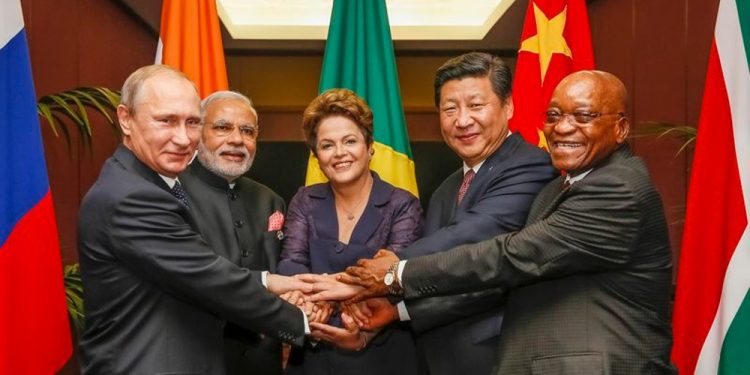A Russian official has admitted that BRICS is working to create its own currency to challenge the dominance of the United States dollar and potentially replace its hegemonic position in international trade.
BRICS, an international economic alliance of Brazil, Russia, India, China and South Africa, has received a boost in support of its de-dollarization efforts following the outbreak of the Russian special military operation in Ukraine. Moscow found itself reeling under an avalanche of Western-backed sanctions and restrictions against its ability to freely conduct trade in the global market. (Related: Potential BRICS expansion could mark end of dollar as world’s pre-eminent currency.)
Against this backdrop, Russia has taken the lead in strengthening ties between BRICS nations and laying the groundwork for the creation of a common currency to prevent Western economic warfare from affecting them.
During the two-day St. Petersburg International Economic Forum in India, State Duma (parliament) Deputy Chairman Alexander Babakov called for the creation of a joint Indian-Russian common currency to form stronger financial relations between the two nations.
“Our goal should be focused on writing new rules in the financial sphere in order to enable the use of an already common currency,” said Babakov. “It doesn’t matter whether it’s a digital ruble, a digital rupee, a digital yuan or some other currency. But this currency must follow the laws of our respective nations.”
Babakov noted that this proposed new currency should be backed by gold or other precious metals. He pointed out that the American dollar does not benefit the shared objectives of India and Russia, and their reliance on the greenback continues to give the U.S. an unfair amount of leverage over both nations.
Effort to create common currency part of ongoing de-dollarization campaign
The U.S. dollar has been called the “king of currency” due to it becoming the official reserve currency of the world in 1944, a decision made by a delegation from 44 Allied countries called the Bretton Woods Agreement.
Since then, the dollar has enjoyed a powerful status in the world as the most pre-eminent currency in use today, a status that has greatly benefited American elites and has caused a lot of pain to the U.S.’s foes around the world due to the disproportionate amount of influence the dollar has given the U.S. over other economies.
This influence has allowed America to use sanctions and other tools of economic warfare as a means for achieving its foreign policy objectives.
But in recent years, America’s main foreign adversaries, including Russia and China, have been calling for an end to the dollar’s hegemony. This process, known as de-dollarization, is the process of substituting the U.S. dollar as the currency used for international trade.
De-dollarization’s main proponents highlight how reducing other countries’ dependence on the dollar and the American economy would help mitigate the impact of economic and political changes in the U.S. on their own economies. De-dollarization also reduces the exposure of nations to fluctuations in the dollar’s value and to interest rate changes, which can help improve global economic stability and reduce the risk of financial crises impacting more nations.
De-dollarization moves have been gaining speed in the last few years, especially in 2022, when a paper by the International Monetary Fund (IMF) noted that the dollar’s share of global foreign-exchange reserves fell below 59 percent in the fourth quarter of 2022, extending its two-decade-long process of declining.
Furthermore, the IMF noted that the dollar’s decline has not been accompanied by an increase in the shares of its Western allies like the British pound sterling, the Japanese yen or the euro, which are “other long-standing reserve currencies.”
“Rather, the shift out of dollars has been in two directions – a quarter into the Chinese renminbi, and three quarters into the currencies of smaller countries that have played a more limited role as reserve currencies.”
Learn more about the emerging threats to the supremacy of the American dollar at DollarDemise.com.
Watch this episode of the “Health Ranger Report” as Mike Adams, the Health Ranger, interviews finance and precious metals expert Andy Schectman about BRICS+ and the new global reserve currency the alliance is developing that will bring about the demise of the dollar system.
This video is from the Health Ranger Report channel on Brighteon.com.
More related stories:
- Former Treasury official: If US dollar loses global reserve currency status, there will be a complete economic IMPLOSION.
- Analysis claims that covering all lost deposits in failed banks will only hasten dollar collapse.
- Biden’s destructive Russia sanctions are destroying decades-long dominance of dollar as world’s reserve currency; collapse will follow.
- India, Sri Lanka moving toward using Indian rupee for international transactions (while ditching the dollar).
- Egypt joins BRICS-owned New Development Bank, expresses interest in becoming full-fledged member of BRICS.
Sources include:






I think BRICS just might be the 10 nation confederacy the Bible talks about.